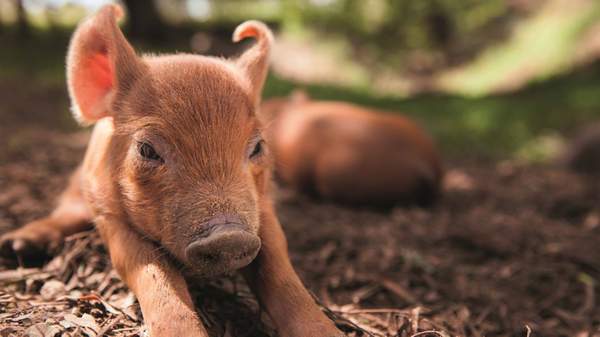Overview
UPDATE: April 27, 2020: The Biggest Little Farm is available to stream via Google Play and YouTube.
Say goodbye to your inner-city digs, pack up your belongings and head to the country — it's time to swap your concrete playground for a grassy, tree-lined, animal-filled one. That's how you might be feeling after watching The Biggest Little Farm, the warm and informative documentary that charts a just-married Californian couple's quest to follow all of the above steps in the name of a better life.
John and Molly Chester's dream is simple, at least on paper. They want to run their own farm, relying on traditional methods and doing so in harmony with nature. One-crop spreads, soulless egg factories and the general type of commerce-driven farming that has become common today aren't for them. Instead, their rural utopia boasts a broad array of creatures and hundreds of different types of edible plants, creating a mini-ecosystem that supplies everything the pair eats — and everything that Molly, a private chef and food blogger, could ever need to cook with.
The fact that a film exists about their efforts, and that it's helmed by John himself — a cinematographer and Emmy award-winning director when he's not working the land — signals the obvious: that the Chesters turned their vision into a reality. Spanning most of the past decade, The Biggest Little Farm chronicles the ups and downs of attempting to transform an unwelcoming 200-acre patch of soil into a thriving natural farming haven, all by following the advice of biodynamic farming guru Alan York. Taking over an abandoned farm, they strip away most of the existing crops, replacing them with new ones. They wait as the greenery grows, and as their newly acquired menagerie of chickens, pigs, ducks, sheep, dogs and other diverse critters all play their part. (Of paramount importance: the animals' poop, of which there's plenty.) First laughed at by their friends and family, the Chesters' support system expands, as does the farm they call home and the business side of the equation.
Bookended by wildfires, with flames threatening to encroach upon the property an hour outside of Los Angeles, The Biggest Little Farm bubbles with timeliness — and not just because of Australia's current catastrophic blazes. The documentary actually first started screening at international film festivals back in 2018, coming in third in the audience choice award in Toronto that year, but the attitude it celebrates is a clear reflection of the growing recognition that much about humanity's current existence is harming the planet. Accordingly, as proved the case with Aussie doco 2040, watching the Chesters' plight proves educational, inspirational and aspirational. Their passion is infectious, whether they're helping birth calves, tending to an ailing pig or endeavouring to save their chickens from coyotes. The movie doesn't aim to take viewers through their feats step-by-step or teach audiences exactly how to follow the same path, but it does show what's possible for anyone willing to try.
When the film leans into the adorable, heartwarming side of such an idealistic venture, cuteness abounds. An outcast rooster befriends a sow, oinking piglets run riot, and dogs lick lambs as if they were cleaning their own offspring. John doesn't shy away from the tougher realities of farm life, though — including wildlife predators, birds pecking through most of their fruit, a tricky snail infestation and serious animal health issues. First and foremost, however, he's viewing his experiences through a firmly upbeat, affectionate, resilient and persistent lens. This is a true tale that starts with a promise to a just-adopted dog, which John saves from an animal hoarder with more 200 critters and pledges to give a loving home, after all. When that pup barked so much that the couple got evicted, that's when John and Molly decided to chase their farming dreams.
The movie's positive spin lends itself to lively animated sequences, bringing Molly's fantasies to the screen a suitably colourful, affable way. Still, as engaging as this rich, gentle documentary is — and as likely as it is to make you wish you could take the Chesters' lead — that jovial mood also results in a few overtly cliched touches. The film's music drips with sentiment, as if it doesn't quite trust that the on-screen critters are enough by themselves. The brightly coloured hues do more than just capture the farm's sights, literally painting a vibrant, sun-dappled picture. And, when it comes to the difficult reality of actually funding this sizeable venture (and making an independent doco about it at the same time), concrete details are glaringly absent. Plus, the personal voiceover sometimes verges on cloying. Worse: the reaction to someone's ill health and its impact on the farm plays as selfish, as if this parcel of land is more important than another person. These are all minor issues, but they do stop a valuable movie about eco-conscious living from being truly great rather than just very good. You'll still want to pack your bags and leave the rat race far behind, though.
Features
Information
When
Thursday, January 16, 2020 - Wednesday, February 5, 2020
Thursday, January 16 - Wednesday, February 5, 2020
Where
Select cinemas in SydneyVarious locations
Price
$15–25-
Event Type
